J. Bradford DeLong's Blog, page 367
May 11, 2018
Abraham Lincoln: 1855 Letter to Joshua Speed: Weekend Reading

Abraham Lincoln (1855): Letter to Joshua Speed: "Dear Speed: You know what a poor correspondent I am...
...Ever since I received your very agreeable letter of the 22nd of May I have been intending to write you in answer to it.
You suggest that in political action now, you and I would differ. I suppose we would; not quite as much, however, as you may think.
You know I dislike slavery; and you fully admit the abstract wrong of it. So far there is no cause of difference. But you say that sooner than yield your legal right to the slave���especially at the bidding of those who are not themselves interested���you would see the Union dissolved. I am not aware that any one is bidding you to yield that right; very certainly I am not. I leave that matter entirely to yourself.
I also acknowledge your rights and my obligations, under the constitution, in regard to your slaves. I confess I hate to see the poor creatures hunted down, and caught, and carried back to their stripes, and unrewarded toils; but I bite my lip and keep quiet.
In 1841 you and I had together a tedious low-water trip, on a Steam Boat from Louisville to St. Louis. You may remember, as I well do, that from Louisville to the mouth of the Ohio, there were, on board, ten or a dozen slaves, shackled together with irons. That sight was a continued torment to me; and I see something like it every time I touch the Ohio, or any other slave-border. It is hardly fair for you to assume, that I have no interest in a thing which has, and continually exercises, the power of making me miserable. You ought rather to appreciate how much the great body of the Northern people do crucify their feelings, in order to maintain their loyalty to the Constitution and the Union.
I do oppose the extension of slavery, because my judgment and feelings so prompt me; and I am under no obligation to the contrary. If for this you and I must differ, differ we must. You say if you were President, you would send an army and hang the leaders of the Missouri outrages upon the Kansas elections; still, if Kansas fairly votes herself a slave state, she must be admitted, or the Union must be dissolved.
But how if she votes herself a slave State unfairly���that is, by the very means for which you say you would hang men? Must she still be admitted, or the Union be dissolved? That will be the phase of the question when it first becomes a practical one.
In your assumption that there may be a fair decision of the slavery question in Kansas, I plainly see you and I would differ about the Nebraska-law. I look upon that enactment not as a law, but as violence from the beginning. It was conceived in violence, passed in violence, is maintained in violence, and is being executed in violence. I say it was conceived in violence, because the destruction of the Missouri Compromise, under the circumstances, was nothing less than violence. It was passed in violence, because it could not have passed at all but for the votes of many members in violence of the known will of their constituents. It is maintained in violence because the elections since, clearly demand its repeal, and this demand is openly disregarded.
You say men ought to be hung for the way they are executing that law; and I say the way it is being executed is quite as good as any of its antecedents. It is being executed in the precise way which was intended from the first; else why does no Nebraska man express astonishment or condemnation? Poor Reeder is the only public man who has been silly enough to believe that any thing like fairness was ever intended; and he has been bravely undeceived.
That Kansas will form a Slave Constitution, and, with it, will ask to be admitted into the Union, I take to be an already settled question; and so settled by the very means you so pointedly condemn. By every principle of law, ever held by any court, North or South, every negro taken to Kansas is free; yet, in utter disregard of this���in the spirit of violence merely���that beautiful Legislature gravely passes a law to hang men who shall venture to inform a negro of his legal rights. This is the substance, and real object of the law. If, like Haman, they should hang upon the gallows of their own building, I shall not be among the mourners for their fate.
In my humble sphere, I shall advocate the restoration of the Missouri Compromise, so long as Kansas remains a territory; and when, by all these foul means, it seeks to come into the Union as a Slave-state, I shall oppose it. I am very loth, in any case, to withhold my assent to the enjoyment of property acquired, or located, in good faith; but I do not admit that good faith, in taking a negro to Kansas, to be held in slavery, is a possibility with any man. Any man who has sense enough to be the controller of his own property, has too much sense to misunderstand the outrageous character of this whole Nebraska business.
But I digress.
In my opposition to the admission of Kansas I shall have some company; but we may be beaten. If we are, I shall not, on that account, attempt to dissolve the Union. On the contrary, if we succeed, there will be enough of us to take care of the Union. I think it probable, however, we shall be beaten. Standing as a unit among yourselves, you can, directly, and indirectly, bribe enough of our men to carry the day���as you could on an open proposition to establish monarchy. Get hold of some man in the North, whose position and ability is such, that he can make the support of your measure���whatever it may be���a democratic party necessity, and the thing is done.
Appropos [sic] of this, let me tell you an anecdote. Douglas introduced the Nebraska bill in January. In February afterwards, there was a call session of the Illinois Legislature. Of the one hundred members composing the two branches of that body, about seventy were democrats. These latter held a caucus, in which the Nebraska bill was talked of, if not formally discussed. It was thereby discovered that just three, and no more, were in favor of the measure.
In a day of two Dougla's [sic] orders came on to have resolutions passed approving the bill; and they were passed by large majorities!!! The truth of this is vouched for by a bolting democratic member. The masses too, democratic as well as whig, were even, nearer unanamous [sic] against it; but as soon as the party necessity of supporting it, became apparent, the way the democracy began to see the wisdom and justice of it, was perfectly astonishing.
You say if Kansas fairly votes herself a free state, as a Christian you will rather rejoice at it. All decent slaveholders talk that way; and I do not doubt their candor. But they never vote that way.
Although in a private letter, or conversation, you will express your preference that Kansas shall be free, you would vote for no man for Congress who would say the same thing publicly. No such man could be elected from any district in a slave-state. You think Stringfellow & Co. ought to be hung; and yet, at the next presidential election you will vote for the exact type and representative of Stringfellow. The slave-breeders and slave-traders, are a small, odious and detested class, among you; and yet in politics, they dictate the course of all of you, and are as completely your masters, as you are the master of your own negroes.
You inquire where I now stand. That is a disputed point���I think I am a whig; but others say there are no whigs, and that I am an abolitionist. When I was in Washington I voted for the Wilmot Proviso as good as forty times, and I never heard of any one attempting to unwhig me for that. I now do no more than oppose the extension of slavery.
I am not a Know-Nothing. That is certain. How could I be? How can any one who abhors the oppression of negroes, be in favor or degrading classes of white people? Our progress in degeneracy appears to me to be pretty rapid. As a nation, we began by declaring that "all men are created equal." We now practically read it "all men are created equal, except negroes" When the Know-Nothings get control, it will read "all men are created equal, except negroes, and foreigners, and Catholics." When it comes to this I should prefer emigrating to some country where they make no pretence of loving liberty���to Russia, for instance, where despotism can be taken pure, and without the base alloy of hypocracy [sic].
Mary will probably pass a day to two in Louisville in October. My kindest regards to Mrs. Speed. On the leading subject of this letter, I have more of her sympathy that I have of yours. And yet let me say I am
Yours friend forever
A. Lincoln
May 10, 2018
Comment of the Day: Graydon: Kevin Williamson Stays Mute ...
Comment of the Day: Graydon: Kevin Williamson Stays Mute on What the Punishment for Abortion Should Be: "Back in the early-to-mid eighties, the first wave of women who had formally studied the ancient Near East, linguists and anthropologists and archaeologists and sociologists, started to publish...
...Almost no one seems to have any awareness of what they published, probably because it got relegated to Women's Studies.
Anyway; one of the things they found out (because they were looking) is that patriarchal forms of social organization have control of female reproduction by (high-status) men as a precondition, not a consequence.�� General access to reproductive health care and technology is a direct threat to everyone who depends for their status and livelihood on that patriarchal social organization, and they're a lot more conscious of this than the people who are generally willing to allow as how women are people and "women, cattle, and slaves" is a lamentable formulation inappropriate to these times.
So, of course Williamson means it; Williamson in some sense HAS to mean it, because the alternative is to give up the idea that he's important, and to give up the social system that's told him that his whole life.�� This is weakness and folly and departs from the path of virtue -- humility isn't easy, even as virtues go -- but patriarchy isn't about virtue.�� It's about raw primate status affirmation, entirely an unfortunate desire...."
#shouldread
#comment
Some very interesting thoughts from Ken Rogoff. But he do...
Some very interesting thoughts from Ken Rogoff. But he does not seem to recognize that Shenzhen is now at least as much a global hub of hardware and manufacturing process innovation in small-scale high-tech devices as anywhere else in the world. World class communities of engineering practice are hard to build. But China looks to be building one. I would dearly love somebody to take a deep close look at Shenzhen and tell me to what extent it is already more than just "the great assembler": Ken Rogoff: Will China Really Supplant US Economic Hegemony?: "Over the next 100 years, who takes over, Chinese workers or the robots?...
...If robots and AI are the dominant drivers of production in the coming century, perhaps having too large a population to care for���especially one that needs to be controlled through limits on Internet and information access���will turn out to be more of a hindrance for China. The rapid aging of China���s population exacerbates the challenge. As the rising importance of robotics and AI blunts China���s manufacturing edge, the ability to lead in technology will become more important. Here, the current trend toward higher concentration of power and control in the central government, as opposed to the private sector, could hamstring China as the global economy reaches higher stages of development.... The US needs to struggle with the problem of how to redistribute income internally, especially given highly concentrated ownership of new ideas and technology. But for China, there is the additional problem of how to extend its franchise as export superpower into the machine age....
The US has the potential to expand the size of its manufacturing base... in terms of output if not jobs. After all, today���s high-tech factory floors produce far more with far fewer workers. And the robots and AI are coming not just in manufacturing and driverless cars. Robo-doctors, robo-financial advisors, and robo-lawyers are just the tip of the iceberg.... China���s rapid growth has been driven mostly by technology catch-up and investment.... While China, unlike the Soviet Union, has shown vastly more competence in homegrown innovation... China���s gains still come largely from adoption of Western technology, and in some cases, appropriation of intellectual property....
In the economy of the twenty-first century, other factors, including rule of law, as well as access to energy, arable land, and clean water may also become increasingly important. China is following its own path and may yet prove that centralized systems can push development further and faster than anyone had imagined, far beyond simply being a growing middle-income country. But China���s global dominance is hardly the predetermined certainty that so many experts seem to assume.... The coming machine age could be a game changer in the battle for hegemony...
#shouldread
If the U.S. wants to avoid a very damaging outcome to all...
If the U.S. wants to avoid a very damaging outcome to all this, the less immoderate Republicans and the Democrats need to be thinking hard about how to take power away from Donald Trump on trade matters���and national security matters���come January 5, 2019: Martin Wolf: Donald Trump declares trade war on China: "The Trump administration has presented China with an ultimatum on trade...
...The US administration is either so foolish that it does not understand this or so arrogant that it does not care.... China is to reduce the US-China trade imbalance by $100bn in the 12 months beginning June 1 2018, and by another $100bn in the 12 months beginning June 1 2019. China should also immediately eliminate all ���market-distorting subsidies��� conducive to excess capacity. It will strengthen intellectual property and eliminate technology-related requirements for joint ventures. ���Furthermore, China agrees to...���cease the targeting of [US] technology and intellectual property through cyber operations, economic espionage, counterfeiting and piracy. China also agrees to abide by US export control laws.��� Moreover, China will withdraw requests for World Trade Organization consultations relating to tariff actions on intellectual property. ���In addition, China will not take any retaliatory action... in response to actions taken or to be taken by the US, including any new US restrictions...���China immediately will cease all retaliatory actions currently being pursued.��� China ���will not oppose, challenge, or...���retaliate against US imposition of restrictions on investments from China in sensitive US technology sectors or sectors critical to US national security���. But ���US investors in China must be afforded fair, effective and non-discriminatory market access and treatment, including removal of...���foreign investment restrictions and foreign ownership/shareholding requirements���. By July 1 2020, China will reduce tariffs in ���non-critical sectors to levels that are no higher than��� equivalent US tariffs. It will also open access to services and farm products as the US specifies. The agreement is to be monitored quarterly. Should the US conclude that China is not in compliance, it may impose tariffs or import restrictions. China ���will not oppose, challenge or take any form of action against��� any such US impositions. China will also withdraw its WTO complaint that it is not being treated as a market economy.
What is to be made of these demands?... Ridiculous. It would require the Chinese state to take control over the economy���precisely what, in other respects, the US demands it not do.... Finally, the idea that the US will be judge, jury and executioner, while China will be deprived of the rights to retaliate or seek recourse to the WTO is crazy. No great sovereign power could accept such a humiliation. For China, it would be a modern version of the ���unequal treaties��� of the 19th century.
The Americans seem sure they can force the Chinese to sue for terms, how ever foolish and humiliating these are. China would indeed be hurt more by a tit-for-tat tariff war than the US. This is because its exports to the US dwarf those from the US to China....Americans who are better aware of the national interest than the administration need to understand that the US will find itself on its own if it seeks conflict. That is what must happen when a leader turns into a self-regarding bully.
#shouldread
Noah Smith: Remember Karl Marx for the many things he got...
Noah Smith: Remember Karl Marx for the many things he got wrong: "Marx didn���t make it to 200, but the ideas he injected into the global conversation and the ideologies that bear his name far outlasted the German economist and philosopher...
...Respect for Marx is enjoying a bit of a resurgence.... But something about this celebration of Marx sits uneasily.... It���s hard to forget the tens of millions of people who starved to death under Mao Zedong; the tens of millions purged, starved or sent to gulags by Joseph Stalin; or the millions slaughtered in Cambodia���s killing fields. Even if Marx himself never advocated genocide, these stupendous atrocities and catastrophic economic blunders were all done in the name of Marxism. From North Korea to Vietnam, 20th century communism always seem to result in either crimes against humanity, grinding poverty or both.... Defenders of Marx will say that Stalin, Mao and Pol Pot exemplified only a perverted caricature of Marxism, and that the real thing hasn���t yet been tried.... Excuses ring hollow. There must be inherent flaws in the ideas that continue to lead countries like Venezuela over economic cliffs. The best way to look for those flaws is to follow Cooper���s advice and read Marx with judicious detachment.
My favorite example of this is a 2013 post in which University of California-Berkeley economic historian Brad DeLong tried to boil Marx���s big ideas down to their essentials, and evaluate each one.... [His] mistakes alone would be enough to hobble an economy and send any economic doctrine to the rubbish heap. Collectivization of agriculture seems to have been particularly disastrous for farm-based societies.... But they can���t explain why communism was so often accompanied by atrocities, or why leaders like Mao and Stalin persisted in failed policies long past the time when wise, benevolent leaders would have changed course. The brutality and insanity of communist leaders might have been a historical fluke, but it also could have been rooted in another of what DeLong sees as Marx���s mistake: the preference for revolution over evolution...
#shouldread
Understanding Karl Marx
So I woke up this morning bright and early ready to work... and I promptly let myself get distracted and procrastinated for an hour tracing links from Noah Smith's denunciation of Karl Marx:
Noah Smith: Remember Karl Marx for the many things he got wrong: "Marx didn���t make it to 200, but the ideas he injected into the global conversation and the ideologies that bear his name far outlasted the German economist and philosopher...
I, of course, agree with Noah���he does cite me favorably, after all. And then I realized that I had never put my "Understanding Karl Marx" lecture slides up anywhere...
https://www.icloud.com/keynote/0DEmQu11yYi1vFh7t3JvZ8swQ
http://www.bradford-delong.com/understanding-marx.html THE STOCK

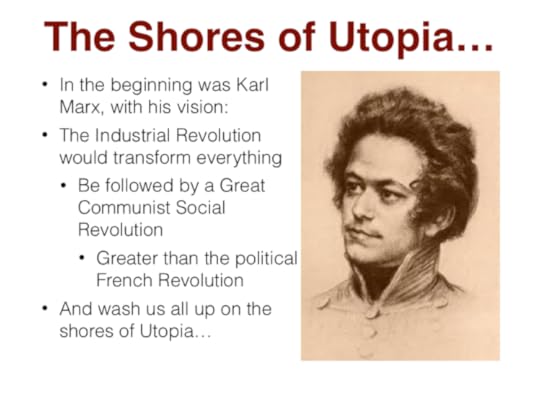



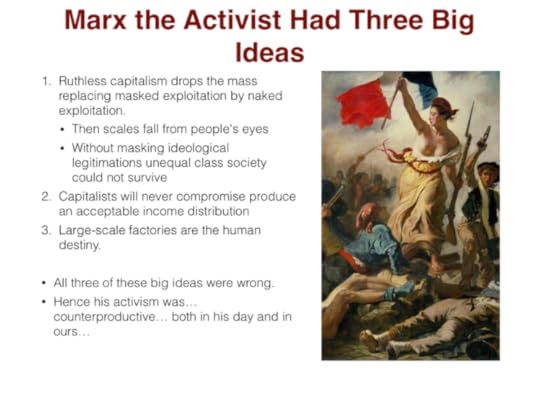
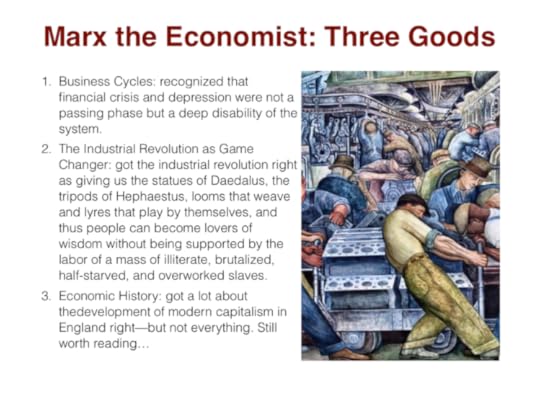
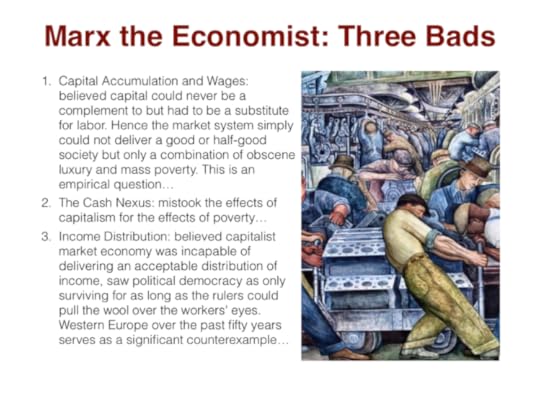
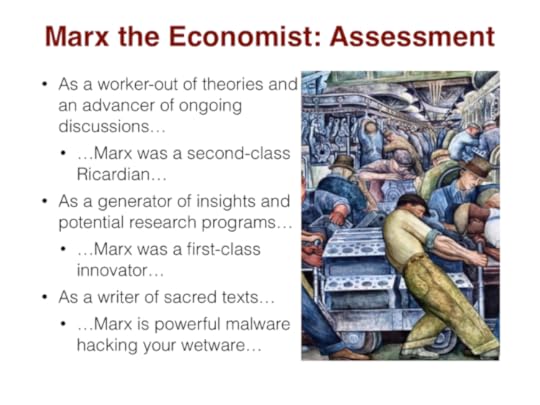

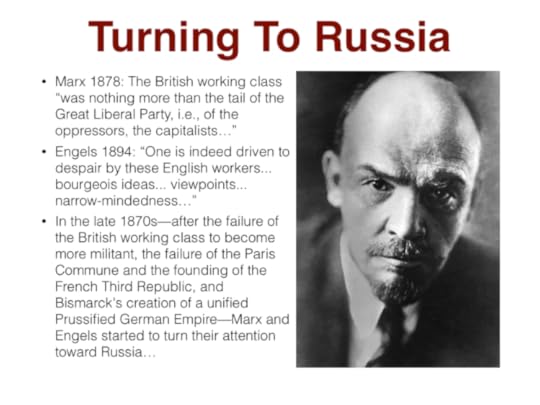

Understanding Karl Marx
J. Bradford Delong
http://bradford-delong.com
brad.delong@gmail.com
@delong
2018-05-10
https://www.icloud.com/keynote/0DEmQu11yYi1vFh7t3JvZ8swQ
http://www.bradford-delong.com/understanding-marx.html THE STOCK
The Shores of Utopia���
In the beginning was Karl Marx, with his vision:
The Industrial Revolution would transform everything
Be followed by a Great Communist Social Revolution
Greater than the political French Revolution
And wash us all up on the shores of Utopia���
The Marxist Intellectual Project
The mature Marx saw the economy as the key to history. This project as carried forward by others ran dry:
In Eric Hobsbawm���s hands it worked well
In Perry Anderson���s hands, not so well
And when Marx���s writings became sacred texts for a world religion, things passed beyond absurd into tragedy and horror���
Marx���s Three-Part Intellectual Trajectory
Marx the Prophet
In this world the New Jerusalem does not descend from the clouds ���prepared as a Bride adorned for her Husband������
But Marx clearly thought at some level that it would.
He got too much into the magic mushrooms of the Isle of Patmos.
Marx the prophet is of interest to cultists, and to historians of cults.
Marx the Activist Had Three Big Ideas
Ruthless capitalism drops the mass replacing masked exploitation by naked exploitation.
Then scales fall from people's eyes
Without masking ideological legitimations unequal class society could not survive
Capitalists will never compromise produce an acceptable income distribution
Large-scale factories are the human destiny.
All three of these big ideas were wrong.
Hence his activism was��� counterproductive��� both in his day and in ours���
Marx the Economist: Three Goods
Business Cycles: recognized that financial crisis and depression were not a passing phase but a deep disability of the system.
The Industrial Revolution as Game Changer: got the industrial revolution right as giving us the statues of Daedalus, the tripods of Hephaestus, looms that weave and lyres that play by themselves, and thus people can become lovers of wisdom without being supported by the labor of a mass of illiterate, brutalized, half-starved, and overworked slaves.
Economic History: got a lot about thedevelopment of modern capitalism in England right���but not everything. Still worth reading���
Marx the Economist: Three Bads
Capital Accumulation and Wages: believed capital could never be a complement to but had to be a substitute for labor. Hence the market system simply could not deliver a good or half-good society but only a combination of obscene luxury and mass poverty. This is an empirical question���
The Cash Nexus: mistook the effects of capitalism for the effects of poverty���
Income Distribution: believed capitalist market economy was incapable of delivering an acceptable distribution of income, saw political democracy as only surviving for as long as the rulers could pull the wool over the workers' eyes. Western Europe over the past fifty years serves as a significant counterexample���
Marx the Economist: Assessment
As a worker-out of theories and an advancer of ongoing discussions���
���Marx was a second-class Ricardian���
As a generator of insights and potential research programs���
���Marx was a first-class innovator���
As a writer of sacred texts���
���Marx is powerful malware hacking your wetware���
Why Did Marx Go Wrong?
I blame Hegel
Marx expects ���unmasking���, and a deeper reality accessible via concentrated thought���
Believed he could access that deeper reality through the labor theory of value
Use value and exchange value
Trapped himself in an intellectual prison-hell
He thought Manchester was typical
Saw Manchester in the late 1840s, at its nadir for the working class
But working class poverty a result of the very bad bargaining position of British workers
Due to demographic pressures
That were about to ease
Marx ���mistook the birth pangs of capitalism for its death throes���
Turning To Russia
Marx 1878: The British working class ���was nothing more than the tail of the Great Liberal Party, i.e., of the oppressors, the capitalists������
Engels 1894: ���One is indeed driven to despair by these English workers... bourgeois ideas... viewpoints... narrow-mindedness������
In the late 1870s���after the failure of the British working class to become more militant, the failure of the Paris Commune and the founding of the French Third Republic, and Bismarck's creation of a unified Prussified German Empire...
Marx and Engels started to turn their attention toward Russia���
What Do You Think?
Comments?
Questions?
For MOAR, take a look at:
http://www.bradford-delong.com/understanding-marx.html
http://www.bradford-delong.com/2016/12/communismresources-a-reading-list.html
http://www.bradford-delong.com/2016/08/communism-and-really-existing-socialism-a-reading-list-for-post-millennials-1.html
Matthew Yglesias on Marxism: Capitalism is looking pretty shabby: (Late) Monday DeLong Smackdown/Hoisted

This is what I want when I call for a better class of DeLong Smackdowns! How do we think this looks not just nine years after my optimism in 2009 back at the end of the American century but five years after Matt wrote?:
Hoisted from the Archives: Matthew Yglesias (2013): May Day Marxism: Capitalism is looking pretty shabby: "DeLong reposted a very interesting 2009 talk... "Understanding Karl Marx"... that I would have enthusiastically endorsed in 2009 but which look weaker four years later...
...DeLong says that Marx the political activist was too pessimistic about the idea that the ruling class would agree to make economic growth pareto optimal within the context of a market economy:
[T]hat even though the ruling class could appease the working class by using the state to redistribute and share the fruits of economic growth it would never do so. They would be trapped by their own ideological legitimations--they really do believe that it is in some sense ���unjust��� for a factor of production to earn more than its marginal product. Hence social democracy would inevitably collapse before an ideologically-based right-wing assault, income inequality would rise, and the system would collapse or be overthrown. The Wall Street Journal editorial page works day and night 365 days a year to make Marx���s prediction come true. But I think this, too, is wrong...
To me that unquestionably looked wrong as of 2009. But in the interim, those Wall Street Journal editorial page tendencies have grown much stronger... Rand-inflected moralism about market outcomes... reduced... Friedman-style pragmatism.... a sharply reduced emphasis... in... stabilization policy, in favor of a "let them eat cake/move to North Dakota" moralism about unemployment. Last but by no means least, it really has become the conventional wisdom among American elites that the appropriate policy response to fiscal imbalance in a time of high and rising income inequality is to restore balance by reducing the scope and generosity of social insurance programs.
Second:
Marx believed that capital is not a complement to but a substitute for labor. Thus technological progress and capital accumulation that raise average labor productivity also lower the working-class wage. Hence the market system simply could not deliver a good or half-good society but only a combination of obscene luxury and mass poverty. This is an empirical question. Marx's belief seems to me to be simply wrong...
This is an empirical question and I continue to believe that Marx's belief is wrong. But the fact is that profit margins are high and rising while wages are at best stagnating. My view is that this is a cyclical phenomenon that represents a failure of the technocratic apparatus of macroeconomic stabilization. But... I hear more and more people disagreeing... not only on the left but on the right.... The growing popularity of... ["]no this isn't a massive policy failure it just reflects the inevitable forces of technology/globalization["]... ties in to the first point about the apparatus of ideological legitimation.
In summary, I'm not a Marxist. But I worry that political conservatives are going to turn me into one.... The collapse of the Soviet Union, a good thing on its own terms, has had the bad consequence of breeding massive complacency among the upper classes in the West. It used to seem important to people in the rich countries to prove that market economies not only could but in fact would lead to broadly rising living standards. But today we're living in a 401(k) world...
#shouldread
May 9, 2018
Exemplifying Equitable Growth: Mr. Google Serves Me a Baker's Half-Dozen from the WCEG Website, and What I Learn Thereby...

Time to relaunch the Equitable Growth http://equitablegrowth.org website!
That makes this a good time to look back at what Equitable Growth does and has been doing over this past half decade. As I grow older, I become more and more and organizational realist: The Purpose of an organization is what it does, rather than what its mission statement says it is going to do or what it���s funders believe that their money is going to pay for. What the worker bees do determines what the organization does. What the planners and vision architects say does not determine what the organization does.
Thus I look for exemplars: What are the things on the current Equitable Growth website that exemplify what it does, or perhaps what it should do?
Let's ask Mr. Google:
The simple���anonymized��� for "site:equitablegrowth.org" produces as its first hits pages aggregating people associated with Equitable Growth, like "Austin Clemens": their headshots, a sentence, or two, and a list of things on the website associated with their name. The search also produces pages aggregating tags: all things on the website tagged with "Macroeconomics". And it produces pages aggregating categories���like "Labor Markets"���plus an about page, and so forth.
But as I scroll down past page upon page upon page of results I find that Mr. Google does not think that people searching for "site:equitablegrowth.org" should have their attention primarily drawn to any worker bee product. There are few direct links to any findings, data, or arguments, rather than to the aggregative pages.
There are some direct links. Those links are, well, links to me: "Equitablog" posts. Here are the top 7 according to Mr. Google: four things that I have written, and three from my highlighting the work of other people���Steve Cecchetti and Enisse Kharroubi, Judy Shulevitz and Heather Boushey, and Simon Wren-Lewis.
The top four google-ranked from me:
June 9, 2017: My joining a letter of worthies begging the Federal Reserve to think hard about what it is doing: Rethink 2%: Even if a 2 percent inflation target set an appropriate balance a decade ago, it is increasingly clear that the underlying changes in the economy would mean that, whatever the correct rate was then, it would be higher today...
March 10, 2016: My interpretation of the "helicopter money" debate as an attempt to create opportunities for central banks to avoid failure at economic management in an era of low interest rates: Social credit is the answer: Today���s debate [over "Helicopter Money"]... is a result of the default Washington-Consensus Great-Moderation assignment of the stabilization-policy role to independent and technocratic central banks.... To speak of ���helicopter money��� is to convey the impression that this is the central bank undertaking its proper business... [but] needs the active support of the directly-elected government... to undertake what is... monetary policy...
May 18, 2015: My pointing out to Krusell and Smith that their critique of Thomas Piketty's Economics in the Twenty-First Century implicitly assumes that depreciation is not the 5% of national income it is but rather 50%, and my further pointing out that their pretending that this error is unimportant is unprofessional: The Theory of Growth and Inequality: Piketty, Zucman, Krusell, Smith, and ���Mathiness���: Paul Romer inquired why I did not endorse his... characterizing Piketty and Piketty and Zucman as a canonical example of what Romer calls ���mathiness���. Indeed, I think that, instead, it is Krusell and Smith (2014) that suffers from ���mathiness������people not in control of their models deploying algebra untethered to the real world in a manner that approaches gibberish...
April 8, 2014: My hopes for the construction of a useful public sphere by Ezra Klein and his posse: Motivated Reasoning and the Launch of Ezra Klein���s Vox.Com: Kudos to Ezra Klein and company for the highly-successful launch of their http://vox.com. But... Ezra Klein worries... it might be... hopeless enterprise.... Paul Krugman... (1) Ezra���s is not a hopeless enterprise.... (2) Nevertheless his technocratic policy debate can only be carried out within the philosophical-liberal community: that conservatives either cannot or will not participate...
The top three google-ranked of me highlighting the work of other people���Steve Cecchetti and Enisse Kharroubi, Judy Shulevitz and Heather Boushey, and Simon Wren-Lewis:
February 17, 2015: My highlighting Steve Cecchetti and Enisse Kharroubi's finding that yes, a hypertrophied financial sector is a drag on the economy as a whole: Evening Must-Read: Why Does Financial Sector Growth Crowd Out Real Economic Growth?: Stephen G Cecchetti and Enisse Kharroubi: "Financial sector growth benefits disproportionately high collateral/low productivity projects��� Where financiers employ the [most] skilled workers��� productivity growth is lower than it would be had��� entrepreneurs attract[ed] the [most] skilled labour���. [Thus] financial booms in which skilled labour work for the financial sector, are sub-optimal when the bargaining power of financiers is sufficiently large���. We focus on manufacturing industries and find that industries that are in competition for resources with finance are particularly damaged by financial booms���"
June 13, 2016: My highlighting Judy Shulevitz's review of Fearless Leader Heather Boushey's Finding Time: The Economics of Work-Life Balance: Must-Read: How to Fix Feminism: Judith Shulevitz: "Heather Boushey argues that the failure of government and businesses to replace the services provided by ���America���s silent partner������the stay-at-home wife���is dampening productivity and checking long-term economic growth.... American families, particularly low-income families, can���t do without a double income.... But having to work should not be confused with wanting to work���. Marissa Mayer... reported that... [at] Google... she slept under her desk, one disgusted feminist, Sarah Leonard, wrote, ���If feminism means the right to sleep under my desk, then screw it������"
September 19, 2016: My highlighting Simon Wren-Lewis's rejection of demands that he should "stick with the economics": Must-Read: Economics, DSGE and Reality: Simon Wren-Lewis: "Entering the ERM at an overvalued exchange rate would lead to a UK recession���. I saw close up academics who had not done similar research but who had influence use that influence to support simplistic reasoning. It is difficult to understate the impact that had���. After the financial crisis��� governments from around the world first went with what macroeconomic theory and evidence would prescribe, and then in 2010 dramatically went the opposite way���. The Coalition government���s constant refrain was simply wrong... [and] the Labour opposition seemed uninterested.... Austerity is not the first time good advice has been ignored at considerable cost.... Tell me I should ���stick with the economics���, you can see why given my experience I find that rather difficult to do. It is a bit like asking a chef to ignore how bad the service is... and just stick with the cooking..."
And then, down toward the both of the seventh page of search results, there is something: From last month:
Sarah Jane Glynn: Gender wage inequality What we know and how we can fix it: "Over the past 40 years, women['s]... rising incomes became a significant part of overall household financial stability.... Yet... (1) Women make up... close to half of all currently employed workers (46.7 percent), yet the average earnings of all women who work full time, year round is 80.5 percent of men who.... (2) Women���s earnings are critical... more likely than men to be single heads of households raising children.... Families that have experienced real, inflation-adjusted income growth since the 1970s are likely to be married couples where the wife works. (3).... If women had not increased their work hours since 1979, U.S. GDP in 2012 would have been 11 percent lower...
What does this mean?
My first conclusion is that Mr. Google is, at least relative to my expectations as of the early 2000s, a failure. Mr. Google is of little help here. Raw google rank���the predisposition of Google to return a page independent of search terms���is not a good guide to either how Equitable Growth is influencing the technocratic and moral philosophical conversation nor to the best things that Equitable Growth has done over the past half decade plus. The hope was that the trails humans left in the web would prove a useful guide to what you should pay attention to. But that has not worked: Mr. Google is happy to send you to the Equitable Growth aggregator page on "Macroeconomics" but does not have strong views on what the best contributions of Equitable Growth to the debate on macroeconomics have been.
My second conclusion is that the death of the weblog is overstated.
Now what Ezra Klein calls the ���flow��� has indeed moved away from the open bloggy web. It has moved behind paywalls and onto Twitter, into Facebook and Instagram, and into organizations that (with some honorable exceptions) either have very strong funders or partake strongly of the clickbait nature. Plus the new "flow" is hard to search for in real time: things come to your attention when they become viral, which is when they have hacked your or somebody else���s brain rather than when they bring information you want to pay attention to. The quality of the public sphere does seem to have suffered substantially. Good speech is being not driven out but, instead, nearly drowned out by clickbait speech, ignorant speech, and malevolent speech. And the enthusiastic reembrace by for-profit advertising-supported mass media of journalism based on "source cultivation" has not helped.
But people do, more than ever, still attempt to find things on the internet by searching via Mr. Google, imperfect as he may be. And when they do, the links they find are not to working papers or .pdfs or books studies, they are to weblog posts: things bite-sized enough to have attracted enough human trails through the internet to register. Twitter, Facebook, Instagram, and company have become the essential tools to become part of the "flow". But the "stock"���human knowledge that is findable and accessible when you need it but are not sure of what you need or where it might be���is still indexed by weblog posts.
To the extent that it is indexed and findable at all.
May 8, 2018
Martha Wells Is a Galactic Treasure...

Terminator, if the Terminator were incredibly shy, were addicted to watching soap operas, and were genuinely driven to protect and serve. Martha Wells is making very interesting comments on artificial intelligence, human connection, and narrative and cognition here: Martha Wells All Systems Red:
I COULD HAVE BECOME a mass murderer after I hacked my governor module, but then I realized I could access the combined feed of entertainment channels carried on the company satellites. It had been well over 35,000 hours or so since then, with still not much murdering, but probably, I don���t know, a little under 35,000 hours of movies, serials, books, plays, and music consumed. As a heartless killing machine, I was a terrible failure. I was also still doing my job, on a new contract, and hoping Dr. Volescu and Dr. Bharadwaj finished their survey soon so we could get back to the habitat and I could watch episode 397 of Rise and Fall of Sanctuary Moon...
(���You have to think of it as a person,��� Pin-Lee said to Gurathin. ���It is a person,��� Arada insisted.) Ratthi and Arada sprinted past me carrying medical supplies and spare power cells. I had extended our drone perimeter as far as it could go. We didn���t know that whoever hit DeltFall would show up at any second, but it was a strong possibility. Gurathin had come out to check the big hopper and the little hopper���s systems, to make sure no one other than us had access and that HubSystem hadn���t messed with their code. I kept an eye on him through one of the drones. He kept looking at me, or trying not to look at me, which was worse. I didn���t need the distraction right now. When the next attack came, it was going to be fast. (���I do think of it as a person,��� Gurathin said. ���An angry, heavily armed person who has no reason to trust us.��� ���Then stop being mean to it,��� Ratthi told him. ���That might help.���)...
Martha Wells: Artificial Condition:
When constructs were first developed, they were originally supposed to have a pre-sentient level of intelligence, like the dumber variety of bot. But you can���t put something as dumb as a hauler bot in charge of security for anything without spending even more money for expensive company-employed human supervisors. So they made us smarter. The anxiety and depression were side effects...
You made a mistake, Murderbot, a really bad mistake. How the hell was I supposed to know there were transports sentient enough to be mean? There were evil bots on the entertainment feed all the time, but that wasn���t real, it was just a scary story, a fantasy. I���d thought it was a fantasy...
I was tempted to say no. But if it needed me to watch the show it wanted, then it couldn���t get angry and destroy my brain. Also, I wanted to watch the show, too...
When a major character died in the twentieth episode I had to pause seven minutes while it sat there in the feed doing the bot equivalent of staring at a wall, pretending that it had to run diagnostics. Then four episodes later the character came back to life and it was so relieved we had to watch that episode three times before it would go on. At the climax of one of the main story lines, the plot suggested the ship might be catastrophically damaged and members of the crew killed or injured, and the transport was afraid to watch it. (That���s obviously not how it phrased it, but yeah, it was afraid to watch it.) I was feeling a lot more charitable toward it by that point so was willing to let it ease into the episode by watching one to two minutes at a time. After it was over, it just sat there, not even pretending to do diagnostics. It sat there for a full ten minutes, which is a lot of processing time for a bot that sophisticated. Then it said, Again, please. So I started the first episode again...
ART said, What is causing the delay? Is there a preliminary process left to complete? I had no reason to trust it. Except the way it kept wanting to watch media about humans in ships, and got upset when the violence was too realistic. I sighed, stripped off my clothes, and laid down on the surgical platform...
#books
This File: http://www.bradford-delong.com/2018/05/martha-wells-is-a-galactic-treasure.html
What I describe as the Rubin questions, because these are...
What I describe as the Rubin questions, because these are questions that I first heard when Bob Rubin would ask them when he led the NEC for Clinton in the 1990s: What might we wish two years from now we had done today? What might we wish ten years now that we had done today? Yes, that decision turned out right, but was it the best decision we could have made then given what we could have known then? Yes, that decision turned out wrong, but was there a better decision we could have made then given what we could have known then, and how could we have made it?: Cory Doctorow: Thinking in Bets: a poker-master's Jedi mind-trick for being less wrong: "Annie Duke... Thinking in Bets: Making Smarter Decisions When You Don't Have All the Facts...
...Duke proposes that our own cognitive biases are the biggest impediment to high-quality decisions.... A decision is good if it gave you the highest chance of winning based on the information you had, even if you ended up losing. Mediocre poker players and other normies suffer from "resulting," in which results, not information and reasoning, are used to evaluate decisions. A bad poker player ascribes their losses to "bad luck" and their wins to "skill"���and deploys selective memory, confirmation bias and motivated reasoning to prevent themselves from understanding when they've lucked into an undeserved win and when they've cost themselves money by repeating a bad habit. Duke's answer to this is a lovely shift in perspective: rather than feeling good about yourself for winning (the result), make your self-worth dependent on your process. After every outcome, "workshop" your decision and its aftermath to determine what errors in judgment you made and how you can fix them in future decisions. Make all your sense of accomplishment dependent on how well you execute this process���how many errors you can spot and fix in your choices.
The rest of the book concerns itself with the particulars of this forensic method: how to assemble a "truth-seeking pod"... workshopping methods... drawn from statecraft, corporate boardrooms, the military, poker tables, academia, and other disciplines, and Duke's extensive research offers a wide buffet of techniques to draw on... a sister to Cognitive Behavioral Therapy and the Scientific Method: using peer-review and after-the-fact comparisons of hypotheses to outcomes to help distinguish truth from self-serving self-delusions, the most pernicious of all our mental habits....
There's an unsupported implication of universality.... The tactics Duke catalogs have worked for many people, but it's not clear whether they'd work for everyone. When you're trying to get your brain to default to good practices, the idiosyncrasies of your temperament, modes of thinking and background are all presumably very important.... With all that said, I recommend this book very highly���not all the tactics may work for you, but there's an arsenal of tactics for you to try, and the strategy of judging your self-worth based on your ability to introspectively discover and fix the flaws in your reasoning (rather than winning) is both laudable and socially beneficial. Duke is an entertaining and charming writer, and she has important insights to share...
#shouldread
J. Bradford DeLong's Blog
- J. Bradford DeLong's profile
- 90 followers



